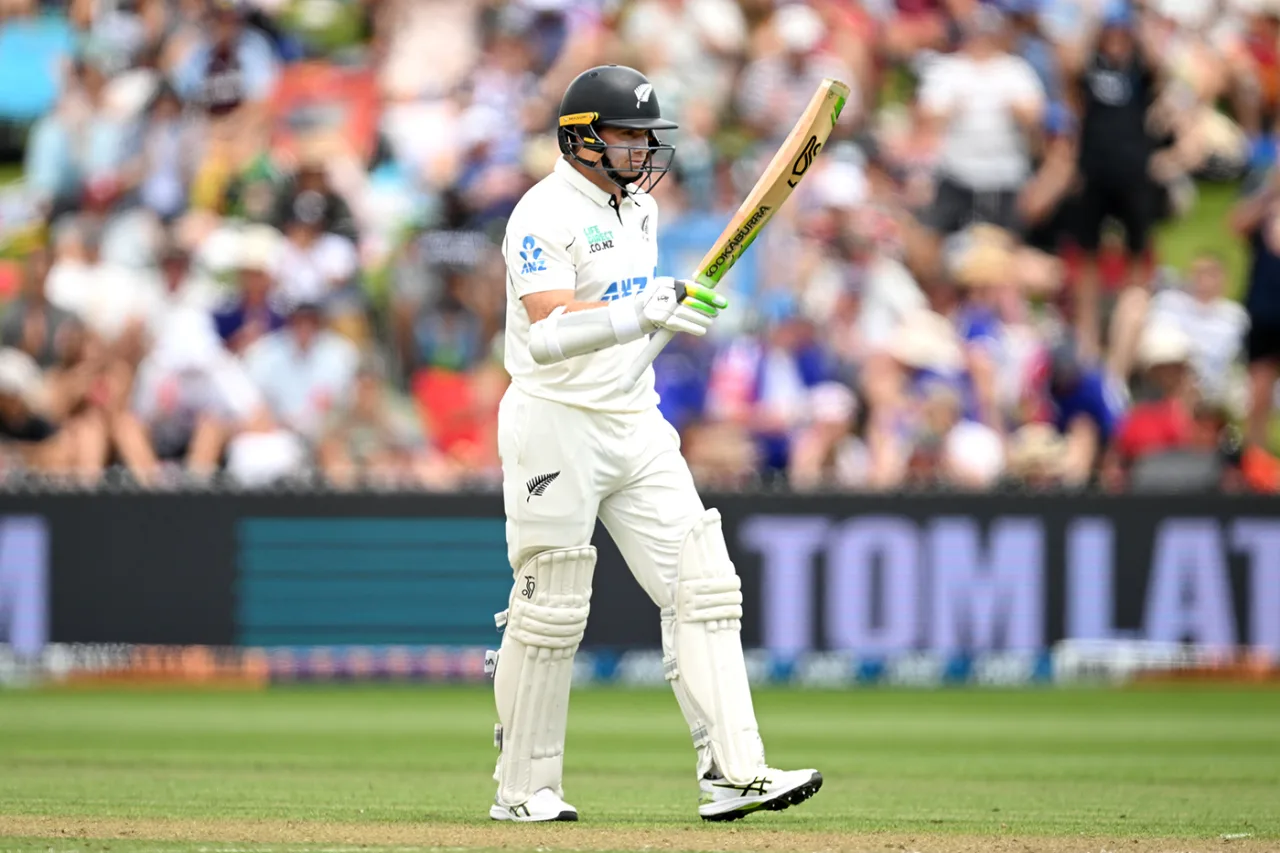Latest News
Tom Latham, Mitchell Santner fifties prop up New Zealand

Half-centuries to Tom Latham and Mitchell Santner added some gloss to a battling New Zealand innings on the opening day of the third and final Test against England in Hamilton.
Whereas the second Test was a maelstrom of match-shaping moments, this Test progressed at an altogether more believable pace but the situation at stumps was similar, New Zealand having blown a position of strength in the face of a persistent England performance that left the day evenly poised, thanks in no small part to Santner’s unbeaten fifty off 54 balls with his side nine wickets down.
In Wellington, New Zealand ended the first day on the back foot at 86 for 5 in response to their opponents’ 280, clawed back from 4 for 43. Here, an opening partnership of 105 between Latham and Will Young – standing in while Devon Conway is on paternity leave – had the hosts in unfamiliar territory for this series before they lurched to 231 for 7, losing five wickets for 59 runs.
But a neat cameo of 23 in 10 balls from Tim Southee in his farewell match, which included three sixes to take his tally to 98 from his 107-Test career, and Santner’s late charge lifted them to 315 for 9 at the close, the Black Caps adding 76 runs off the last eight overs of the day.
England’s bowlers lacked bite in the first session but they frustrated New Zealand through the middle session and lured them into some loose shot selection during the evening.
Latham’s half-century underpinned the hosts’ steady start after Young failed to add to his 42 runs after lunch – a staggering 40 of those coming in fours – and Kane Williamson couldn’t convert, falling for 44 when he was bowled in slow-motion trying in vain to kick a Mathew Potts delivery away from his stumps.
Were it not for Santner’s freewheeling knock, New Zealand could have been in a worse state with no other batter passing Southee’s score from No. 10.
New Zealand’s recalibrated opening partnership of Latham and Young expertly navigated the morning session, reaching lunch at 93 without loss after being sent in by England under skies which had turned from bright to overcast within the hour before play, then returned to blazing sunshine after the main meal break.
Young made a watchful start, facing 10 deliveries before he got off the mark with four off Potts, himself making his first appearance of the series in replacing Chris Woakes.
Young was into his work after that, no doubt to the delight of New Zealand fans who had been willing his inclusion after his Player-of-the-Series performance on the Black Caps’ successful tour of India which was just a matter of weeks ago but felt so distant as their side slid to a 2-0 deficit against England.
He was streaky to begin with, his next two boundaries coming off the edge through backward point and piercing the cordon. But by halfway through the morning session, Young and Latham had negotiated a nibbling pitch to ease their way to 46 without loss, already more than double New Zealand’s previous best opening partnership this series.
Shortly after the first drinks break, Young had helped himself to six fours all up, punishing Brydon Carse twice in one over as the England quick struggled to nail his lengths.
Latham was dropped on 12 and 53 by Ben Duckett, either side of England breaking his stand with Young, prised out by an excellent Gus Atkinson delivery which drew an edge to Harry Brook at second slip.
Williamson – unaccustomed to waiting so long to be called upon in this series – pulled a Carse short ball through deep backward square for four. And, when Potts finally had Latham caught down the leg side, it looked like Williamson would again need to stand up for his team, albeit from a superior position of 142 for 2.
Having burned a review as Ben Stokes hopefully sought to have Latham out caught behind off his own bowling, the England captain wisely over-ruled wicketkeeper Ollie Pope’s insistence that he’d snaffled Williamson down the leg side off Stokes for 20, replays vindicating Stokes’ decision.
Rachin Ravindra spooned Carse straight to Duckett at gully for a soft dismissal and, apart from Williamson’s freakish dismissal trying to fend Potts back down the pitch only to lose the ball behind him as it evaded his searching boot and dribbled into the base of middle stump, the loose wickets continued.
Daryl Mitchell picked out Stokes at mid off, Glenn Phillips swung wildly at a Potts ball outside off and sent it straight to Zak Crawley at backward point and Blundell chipped Carse to cover point, where Jacob Bethell took a strong catch above his head.
It took some special fielding by Brook to remove Matt Henry hooking Stokes to the young England star, who pulled the ball down inside the boundary rope and parried it up before he went over, jumping back in to complete the catch.
Santner, brought in as a frontline spinner for this game at the expense of Nathan Smith, was hit on the top of the helmet by a Stokes bouncer but he shrugged off the blow to play a key role in New Zealand’s recovery.
Southee delighted his home crowd when he swung Stokes for back-to-back sixes, eliciting an involuntary grin from Stokes, who conceded 17 off the over.
Seemingly determined to reach his ton of maximums, Southee slammed the first delivery with the second new ball for another six over deep midwicket off Atkinson and a fumble on the boundary by Duckett resulted in four off the next ball. Two balls later, however, Southee’s fun was over when he tried to go down the ground and skied to Carse at mid-off.
A four off Potts in the final over drew Santner within reach of his fifty and he grabbed it in style, launching the last ball of the day for six over long-off. Potts ended with 3 for 75 and Atkinson 3 for 55.
Brief scores:
New Zealand 315 for 9 in 82 overs (Tom Latham 63, Mitchell Santner 50*, Will Young 42, Kane Williamson 44, Tom Blundell 21, Tim Southee 23; Gus Atkinson 3-55, Mathew Potts 3-75, Brydon Carse 2-78) vs England
[Cricinfo]
Latest News
IPL2025: Arya and Prabhsimran shine but Punjab Kings suffer first-ever washout

Punjab Kings [PBKS] had to settle with just one point despite scoring 201 on a slow pitch as late-evening thunders showers washed out the chase in Kolkata. They will be disappointed for they had done the hard work on a pitch whose consensus reading was “very, very slow”. The one point moved PBKS to No. 4 on the points table while the lagging Kolkata Knight Riders rose to No. 7 with seven points from nine matches.
Outside the frustration of not getting the win, PBKS will be pleased with their openers, Priyansh Arya and Prabhsimrn Singhe, whose half-centuries took them to the daunting total in tough conditions. Especially how they scored the runs. They were almost obsessed with not over-hitting, holding their shape and relying more on their timing, adding 120 for the first wicket, PBKS’ only century stand this IPL. Arya scored 69 off 35, Prabhsimran 83 off 49, and even though the last six overs produced only 42, PBKS were confident they had scored an above-par total.
On the slow track with grip available for those bowling into the pitch, PBKS took 74 off the eight overs of spin between Varun Chakravarthy and Sunil Narine. Even Harshit Rana, KKR’s slower-ball specialist, was allowed to bowl only two overs for 27 runs.
Arya, in particular, was clever in his targeting of the bowlers. He took 50 off 20 balls of pace, and just 19 off 15 balls of spin. Prabhsimran took the spinners on, taking 41 off 22 balls bowled by them. Both of them were measured in the first couple of overs, getting used to the pace in the pitch, before targeting the pace bowlers. Arya preferred timing – his first four fours were driven between mid-off and cover – and Prabshimran struggled early, getting to only 34 off 32 at one point.
With an audacious switch-hit six off Narine, Prabhsimran turned his innings around, in the process consigning Narine to a 22-run over. His worst has been 23 in all T20 cricket. Prabhsimran scored 49 off the last 17 balls he faced; Shreyas Iyer managed only five in a 40-run stand with him.
That the death overs were not easy to hit only encouraged PBKS. Andre Russell managed reverse-swing, Narine and Varun conceded just 13 in their final overs, and Vaibhav Arora drew purchase when he bowled slower balls. PBKS were confident there wouldn’t be much dew either, but we never could find out.
Scores:
Punjab Kings 201 for 4 (Prabhsimran Singhe 83, Priyansh Arya 69, Vaibhav Arora 2-34, Varun Chakravarthy 1-39, Andre Russel 1-27) vs Kolkata Knight Riders 7 for 0 in 1 over Match abandoned
[Cricinfo]
Latest News
Heat index is likely to increase up to ‘Caution level’ at some places in Eastern and North-central provinces and Monaragala, Hambantota, Jaffna, Mullaittivu, Kilinochchi, Vavuniya and Kurunegala districts

Warm Weather Advisory
Issued by the Natural Hazards Early Warning Centre of the Department of Meteorology at 3.30 p.m. 26 April 2025, valid for 27 April 2025.
The public are warned that the Heat index, the temperature felt on human body is likely to increase up to ‘Caution level’ at some places in Eastern and North-central provinces and Monaragala, Hambantota, Jaffna, Mullaittivu, Kilinochchi, Vavuniya and Kurunegala districts.
The Heat Index Forecast is calculated by using relative humidity and maximum temperature and this is the condition that is felt on your body. This is not the forecast of maximum temperature. It is generated by the Department of Meteorology for the next day period and prepared by using global numerical weather prediction model data.

Effect of the heat index on human body is mentioned in the above table and it is prepared on the advice of the Ministry of Health and Indigenous Medical Services.
ACTION REQUIRED
Job sites: Stay hydrated and takes breaks in the shade as often as possible.
Indoors: Check up on the elderly and the sick.
Vehicles: Never leave children unattended.
Outdoors: Limit strenuous outdoor activities, find shade and stay hydrated. Dress: Wear lightweight and white or light-colored clothing.
Note:
In addition, please refer to advisories issued by the Disaster Preparedness & Response Division, Ministry of Health in this regard as well. For further clarifications please contact 011-7446491.
Latest News
Minister of Foreign Affairs pays his last respects to Pope Francis

Minister of Foreign Affairs, Foreign Employment and Tourism, Vijitha Herath represented Sri Lanka at the funeral of Pope Francis on Saturday [26]
-

 Features5 days ago
Features5 days agoRuGoesWild: Taking science into the wild — and into the hearts of Sri Lankans
-

 News5 days ago
News5 days agoOrders under the provisions of the Prevention of Corruptions Act No. 9 of 2023 for concurrence of parliament
-

 Features6 days ago
Features6 days agoNew species of Bronzeback snake, discovered in Sri Lanka
-

 News4 days ago
News4 days agoProf. Rambukwella passes away
-

 News6 days ago
News6 days agoPhoto of Sacred tooth relic: CID launches probe
-

 Opinion5 days ago
Opinion5 days agoSri Lanka’s Foreign Policy amid Geopolitical Transformations: 1990-2024 – Part IX
-

 Features6 days ago
Features6 days agoSri Lanka’s Foreign Policy amid Geopolitical Transformations: 1990-2024 – Part VIII
-

 Features2 days ago
Features2 days agoThe Truth will set us free – I












